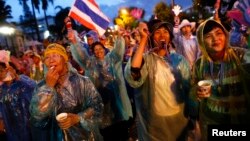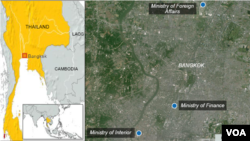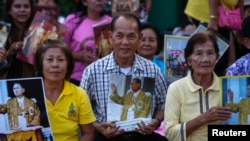BANGKOK —
In Thailand's capital, anti-government protestors kept up pressure on the government of Prime Minister Yingluck Shinawatra Tuesday. Protesters occupied more government ministries in a bid to pressure her government to resign.
Bands of roaming protesters crisscrossed the Thai capital Tuesday in a bid to occupy more government ministries and demand workers go home. Thousands of whistle-blowing rally goers targeted the government ministries of agriculture, tourism, transport and the interior.
While protests have grown heated, Prime Minister Yingluck says authorities would not resort to violence. She called on them to obey the law and avoid the use of "mob rule." She has vowed not to stand down or dismiss parliament.
But the Criminal Court Tuesday approved an arrest warrant for protest leader and former Democrat Party member Suthep Thaugsuban. On Monday evening Prime Minister Yingluck announced the widening of internal security laws to cover the capital, Bangkok, and nearby provinces.
The Prime Minister said the heightened protests had affected public peace and order and led to the government invoking the internal security act in Bangkok and nearby provinces. She called on "fellow citizens" not to support protests that violated the law.
The internal security laws grant authorities power to impose curfews, restrict access to buildings and ban the use of electronic devises.
News of the tighter security laws did little to stem the rallies, with thousands of protestors seen outside official buildings.
Kraisak Choonhavan, a member of the opposition Democrat Party, which led the protests, says crowds highlighted the popular discontent with the government's policies. "The internal security act will anger them more. They will defy that. We can probably expect more trouble in the next few days and the sit-in in the Ministry of Finance is symbolic to the people's discontentment of the Ministry's key role in the financial policy that has angered the people," Kraisak stated.
Kraisak said a majority of the protesters are from Bangkok. But tens of thousands from provincial regions have also come to the capital, because they are upset over unpopular plans for government water infrastructure projects and the central government's failure to address issues of importance to farming communities.
The rallies were triggered by a parliamentary push by Yingluck's coalition government to pass a controversial amnesty bill covering political protests and criminal acts dating back more than eight years. It also included corruption cases seen by critics as favoring Yingluck's older brother, Thaksin Shinawatra, who fled Thailand in 2008 to avoid a two year prison term for corruption.
The bill was later voted down in the Senate but the move failed to stem the growing momentum against the government. Protesters accuse Thaksin of being too influential over his sister's administration.
Analysts expect an intensification of pressure on the government in the coming days. Thitinan Pongsudhirak is a political scientist at Chulalongkorn University. "The next few days we will see intensifying brinkmanship from the anti-government side. It is very clear there is a coalition broad-based and in large numbers based in Bangkok that wants to change the government. The government is likely to be forced to rely on mobilizing its own supporters," he said.
Pro-government supporters, known as Red Shirts, are largely middle and working class backers of pro-Thaksin governments who have been rallying at a stadium on the outskirts of Bangkok. But analysts say there are divisions among the ranks, with some former Red Shirt groups joining the latest rallies. Analysts fear a clash between Red Shirt supporters and anti-government protestors.
The uncertainties triggered selling on the Thai foreign exchange and share markets. The U.S. State Department joined other foreign embassies to warn nationals to exercise caution in Bangkok, amid fears of escalating violence.
Bands of roaming protesters crisscrossed the Thai capital Tuesday in a bid to occupy more government ministries and demand workers go home. Thousands of whistle-blowing rally goers targeted the government ministries of agriculture, tourism, transport and the interior.
While protests have grown heated, Prime Minister Yingluck says authorities would not resort to violence. She called on them to obey the law and avoid the use of "mob rule." She has vowed not to stand down or dismiss parliament.
But the Criminal Court Tuesday approved an arrest warrant for protest leader and former Democrat Party member Suthep Thaugsuban. On Monday evening Prime Minister Yingluck announced the widening of internal security laws to cover the capital, Bangkok, and nearby provinces.
The Prime Minister said the heightened protests had affected public peace and order and led to the government invoking the internal security act in Bangkok and nearby provinces. She called on "fellow citizens" not to support protests that violated the law.
The internal security laws grant authorities power to impose curfews, restrict access to buildings and ban the use of electronic devises.
News of the tighter security laws did little to stem the rallies, with thousands of protestors seen outside official buildings.
Kraisak Choonhavan, a member of the opposition Democrat Party, which led the protests, says crowds highlighted the popular discontent with the government's policies. "The internal security act will anger them more. They will defy that. We can probably expect more trouble in the next few days and the sit-in in the Ministry of Finance is symbolic to the people's discontentment of the Ministry's key role in the financial policy that has angered the people," Kraisak stated.
Kraisak said a majority of the protesters are from Bangkok. But tens of thousands from provincial regions have also come to the capital, because they are upset over unpopular plans for government water infrastructure projects and the central government's failure to address issues of importance to farming communities.
The rallies were triggered by a parliamentary push by Yingluck's coalition government to pass a controversial amnesty bill covering political protests and criminal acts dating back more than eight years. It also included corruption cases seen by critics as favoring Yingluck's older brother, Thaksin Shinawatra, who fled Thailand in 2008 to avoid a two year prison term for corruption.
The bill was later voted down in the Senate but the move failed to stem the growing momentum against the government. Protesters accuse Thaksin of being too influential over his sister's administration.
Analysts expect an intensification of pressure on the government in the coming days. Thitinan Pongsudhirak is a political scientist at Chulalongkorn University. "The next few days we will see intensifying brinkmanship from the anti-government side. It is very clear there is a coalition broad-based and in large numbers based in Bangkok that wants to change the government. The government is likely to be forced to rely on mobilizing its own supporters," he said.
Pro-government supporters, known as Red Shirts, are largely middle and working class backers of pro-Thaksin governments who have been rallying at a stadium on the outskirts of Bangkok. But analysts say there are divisions among the ranks, with some former Red Shirt groups joining the latest rallies. Analysts fear a clash between Red Shirt supporters and anti-government protestors.
The uncertainties triggered selling on the Thai foreign exchange and share markets. The U.S. State Department joined other foreign embassies to warn nationals to exercise caution in Bangkok, amid fears of escalating violence.






